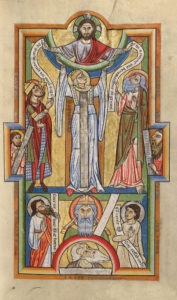Thoughts on Sunday’s Lessons for Aug. 19, 2018

Wisdom, 1170s parchment folio page in tempera, gold and silver leaf and ink. J. Paul Getty Center, Los Angeles. (Click image to enlarge.)
First Reading (Track One): 1 Kings 2:10-12; 3:3-14
David died after 40 years as king, and his son Solomon ascended to the throne. Solomon, the second son of David and Bathsheba, will go on to a majestic reign. As we see him here at the beginning, though, Solomon knows well that he is young and inexperienced. When God comes to Solomon in a dream and invites him to ask for whatever he might wish, Solomon chooses wisely, by asking not for long life or riches but for the wisdom to govern well. God is pleased, and rewards Solomon with wisdom and honor, asking only that he walk in God’s way. All will go well for many years, but Solomon’s reign, sadly, will come to a bad end when the lure of great power corrupts him.
First Reading (Track Two): Proverbs 9:1-6
What is wisdom? What is foolishness? How do we gain the one and learn from the other? Reflect on Sunday’s readings for insight. Wisdom is often personified in the First Testament as a woman, present with God at the Creation. In this short passage from Proverbs, traditionally (although surely not historically) said to have been written by Solomon himself, we see Wisdom setting the table for a great feast, to which she invites the simple to come and be made wise. Through wisdom we gain insight and become mature. We learn to walk in God’s way.
Psalm (Track One): Psalm 111
Again we chant together a Psalm that we heard earlier this year (during the season after Epiphany) in the context of different readings. One of the many Psalms that sing God’s praise with joy and exultation, it shouts out our thanksgiving for all of God’s work, all of God’s majesty and splendor, all of God’s justice that lasts forever. God feeds us. God’s covenant redeems us. The people shout “Hallelujah!” “Praise God!”
Psalm (Track Two): Psalm 34:9-14
The notion of “fearing” God often gives rise to misunderstanding. I remember as a child being puzzled and perhaps a little disturbed the first time I encountered this, and I hurried to ask Mom: “What does fearing the Lord mean? Are we supposed to be afraid of God?” It’s good to recognize its true sense: We should not be afraid but in awe – awestruck by God’s love and righteousness. Hear the Psalmist sing: follow God’s way. Speak kindly and with truth. Avoid evil and do good. Work for peace.
Second Reading: Ephesians 5:15-20
This short passage from the letter to the Ephesians fits neatly into the pattern of this week’s readings with its focus on pursuing wisdom, not foolishness, and fearing God not in fright and alarm but with awe that inspires love. It’s worth noting that its explicit command to avoid drunken debauchery has sometimes been interpreted in modern times to support the complete prohibition of alcoholic beverages, but we know how that came out; we can turn to the Wedding Feast at Cana to gather that Jesus and his family and friends had no objection to the social enjoyment of wine.
Gospel: John 6:51-58
Jesus’ long narrative about the bread of life has taken a turn. We have seen awed crowds following Jesus after he fed thousands with bread and fish, hoping to see more signs and maybe get more bread. Now a new crowd of Pharisees and temple leaders confronts Jesus and pushes back, especially when Jesus doubles down on his talk of “living bread” by adding that everyone must “eat his flesh and drink his blood” to gain eternal life. When John’s Gospel was written after the destruction of the Temple, early Christianity and Rabbinic Judaism were angrily tearing apart. In John’s frequent use of “The Jews” as a dismissive term for the temple authorities who opposed Jesus, we hear a sad refrain that fostered centuries of anti-Judaism.
What are “Track 1” and “Track 2”?
During the long green season after Pentecost, there are two tracks (or strands) each week for Old Testament readings. Within each track, there is a Psalm chosen to accompany the particular lesson.
The Revised Common Lectionary allows us to make use of either of these tracks, but once a track has been selected, it should be followed through to the end of the Pentecost season, rather than jumping back and forth between the two strands.
For more information from LectionaryPage.net, click here.
